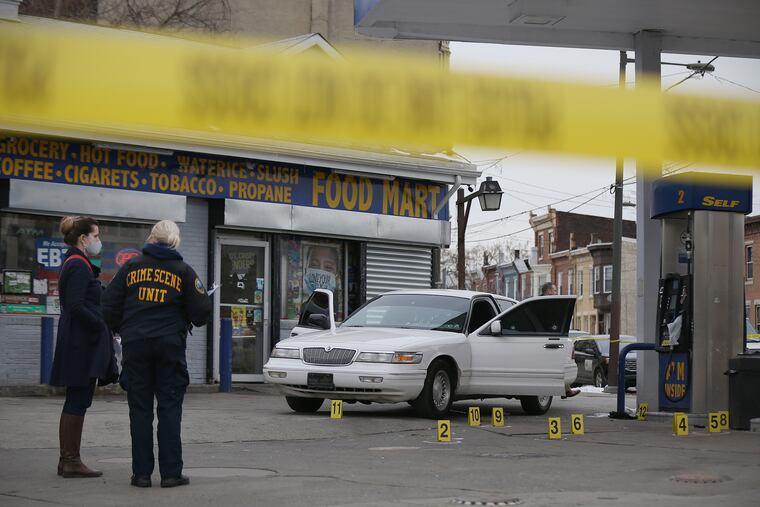Gun violence is a citywide emergency. Declaring that doesn’t demand more policing or incarceration. | Editorial
Every day this year, at least one person has been killed and more than five people have been shot. A new approach is necessary.

After a historically bloody 2020 for Philadelphia, shootings and gun fatalities are not relenting. Already in 2021, at least 71 people died of homicides — that’s before we know the full extent of a Wednesday afternoon mass shooting in Olney in which seven people were injured, according to early reports.
Even as overall violent crime remains historically low, gun violence is a daily occurrence in some Black and brown neighborhoods. If there was a gun violence hot spot between City Hall and Rittenhouse Square, and 95% of the shooting victims were white, it’s hard to imagine that the city would not use every tool at its disposal.
» READ MORE: Philly’s gun violence increased in 2020 as COVID-19 lockdown measures went into effect, study finds
In September, Councilmember Jamie Gauthier introduced a resolution calling on Mayor Jim Kenney to declare a “citywide gun violence emergency.” The resolution calls for the administration to provide weekly briefings on gun violence and improve collaboration between agencies and stakeholders. The call has precedent: In 2018, Kenney declared the opioid crisis in Kensington a “disaster,” which enabled him to create an emergency response center and tap more funds.
The opioid emergency declaration recognized that “despite [the city’s] efforts and increased resources, the problems facing [Kensington has] only continued to grow ... a new approach is necessary.”
Every day this year, at least one person has been killed and more than five shot. A new approach is necessary.
Five months since the resolution, and Mayor Kenney refuses to sign an emergency declaration. A spokesperson for the Office of Violence Prevention told WHYY last week that the resolution calls for a “State of Emergency,” which would mean “curfews, and might result in what many call ‘over-policing.’”
The resolution calls for none of that. Even if a declaration would allow Kenney to impose a curfew and other “overpolicing” measures, it doesn’t require him to do it. Kenney stated many times that Philadelphia can’t arrest its way out of the overdose crisis, yet he signed an opioid emergency declaration.
The path out of the gun violence crisis is through public health prevention models, investment in economic opportunity, and behavioral health resources to address trauma — not simply locking more people up. That effort requires and deserves the same administrative backing as large policing efforts or the COVID-19 response.
» READ MORE: Gun violence is a public health crisis just as important as the pandemic | Opinion
A majority of Council supports the resolution, an online petition calling on Kenney to adopt the resolution has more than 13,000 signatures, and activist Jamal Johnson started a hunger strike to get Kenney’s attention.
The main element in Kenney’s gun violence prevention plan is the Gun Violence Intervention, a reboot of the 2013 Focused Deterrence effort that had been criticized as “overpolicing.” The administration promised that this time, social services would be the main element. Since August, GVI only connected 25 individuals to services, while increasing patrols and imposing additional scrutiny from federal and state partners — raising concerns about the balance of program elements.
Kenney continues to demand blind trust. The city’s gun violence prevention efforts haven’t earned it. Throughout his tenure, Kenney has spent millions on violence prevention programs that have gone unevaluated — while shootings continue to rise. Declaring gun violence a citywide emergency is not a call for more policing or incarceration. It is an acknowledgment of reality.